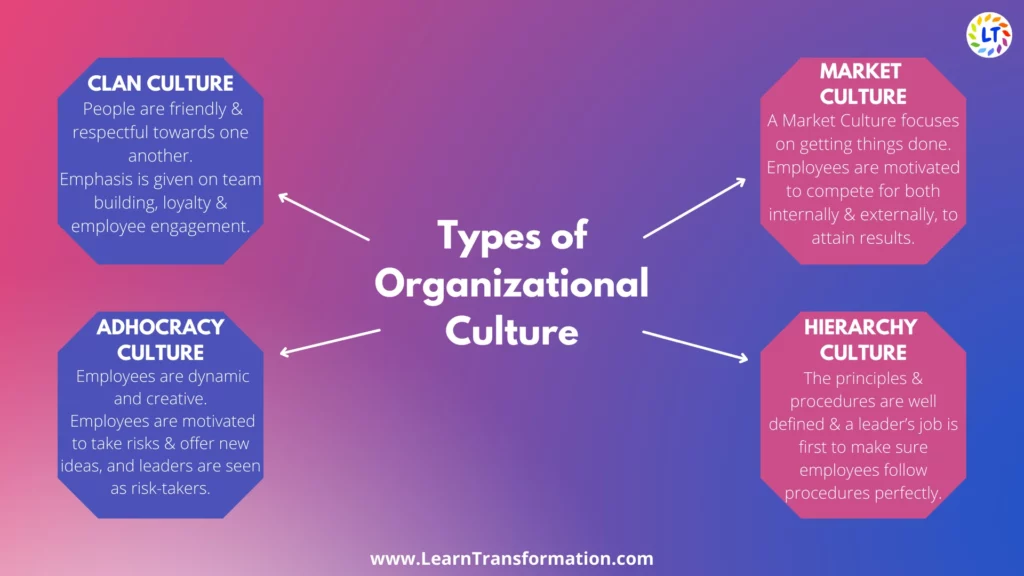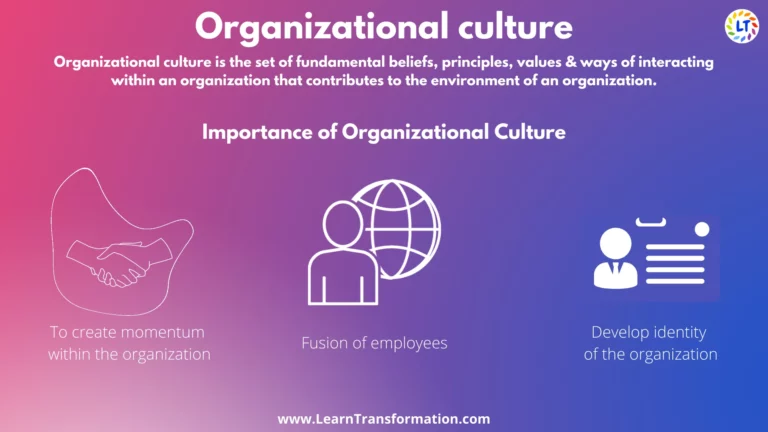Company culture is the backbone of any successful organization.
Simon Sinek
Transforming Your Organization’s Culture: Strategies for Success
Organization culture is the set of fundamental beliefs, principles, values & ways of interacting within an organization that contributes to the environment of an organization. Organizational culture, though impalpable, has a significant effect on employees & organizational outcomes. An organization’s culture model determines what employees consider suitable behavior & how they feel about working for the organization. It defines & generates a unique environment to work in.
It influences how individuals, working teams & the organization plan, execute and manage their work. In this way, it helps determine the pace & efficiency with which work is finished. Further, Every organization has a distinct type of organizational culture making it different from the other & giving it a sense of direction. Moreover, The culture followed by the organization has a sound impact on the employees and their relationship with themselves. So, understanding the culture of their workplace is important for the employees.
Google, while in the limelight for many reasons today is also acknowledged for its culture as the fountain of its success. Category-leading organizations practically always stand out for their culture – companies like Netflix, Zappos, & Southwest Airlines whose aim, for instance, is happy employees.
Why Organization Culture?
So why is proper functioning of organizational culture forefather to all other theories of success? So, Culture affects profit, performance & even survival. If the building block is weak, then no matter what boosting is applied externally, the structure will be weak as well. Just like a room hot from a room heater or electricity that turns a machine into a refrigerator, likewise, culture can also make a company successful.
Also Read: Human Resource Transformation Challenges and Qualities
Importance of Organization Culture

Look around your organization. Your employees are the ones accomplishing tasks, right? What do you know about them? How much you can understand their problems? And how have you attempted to settle them? In current times, competitive organizations have understood the importance of maintaining a healthy culture, for it enables:
To create momentum within the organization-
An Organizational Culture model often starts to serve as the driving force behind a business strategy & may lead to its competitive advantage. So, The causality for the sustainable building of this momentum is –
- Seriousness within employees
- The nature of the culture
- Acknowledgment of leaders & their effectiveness
Thus, It gives a sense of direction to the employees & leads to business success.
1. Fusion of employees-
A healthy organizational culture theory helps the employees, very often from different backgrounds, interact better between themselves & build a mutual understanding when promising several tasks. A culture also improves an employee’s loyalty towards the company on an individual level, and the person may want to work harder. Hence, It is the culture of the organization which draws the best out of each team member.
2. Develop identity of the organization–
Any type of organizational culture has a main role in creating & maintaining the brand identity of the organization for the employees and also for the outsiders.
Leader’s Tip:
Lead by example: In order to inspire people to adopt the desired culture, leaders should exemplify it themselves.
Types of Organization Culture
University of Michigan business professors Robert E. Quinn & Kim S. Cameron introduced 4 types of organizational cultures. So, These are as follows:
1. Clan Culture-
It is a family-like culture. People are friendly & respectful towards one another. In this, leaders are mentors also. Emphasis is given to team building, loyalty & employee engagement. Furthermore, The main values are teamwork, consensus, communication & development. They focus on mentoring, nurturing, but more importantly, everything is done together.
2. Adhocracy Culture-
In this type of organizational culture, employees are dynamic and creative. Adhocracy Culture fosters freedom & individual innovation. Employees are motivated to take risks & offer new ideas. And leaders seem as risk-takers. Ultimately, the organization’s goals to grow & create new products define the success of a company. Their entry of success is whether they can predict market needs & generate new solutions to meet that demand.
Apple is a very good example of Adhocracy Culture – Apple’s founder, Steve Jobs, once said, “We hire people who want to make the best things in the world.” Apple puts stress on creativity & invention.
3. Market Culture-
A Market Culture focuses on getting things complete. Employees are motivated to compete for both internally & externally, to attain results, to focus on the goals, and to get things done. Leaders are both hard drivers & rivals as they have to be tough and have high expectations from the employees. So, Mostly the goals are related to profits, sales, market penetration, stock value.
An example of Market Culture is Oracle. Oracle’s executive chairman & co-founder Larry Ellison has said, “I’m addicted to winning”.
4. Hierarchy Culture-
In this culture, the common themes are control & structure. The principles & procedures are well defined & a leader’s job is first to make sure employees follow procedures perfectly. Furthermore, Efficiencies & predictability are important in this culture. The organization’s goal is results, easy execution & low costs. So, The values that are important for these types of companies are consistency, firmness, protocols, and punctuality.
Burger King is a good example of a Hierarchy Culture. These organizations follow corporate procedures to ensure consistency & results.
Check out the Video-
What do you need for a Productive Culture?
1. Precisely Defined & United Values-
It defines what is important to you as a team, the norms, the behaviors, or particular actions that comply with these norms.
To spot united values, have your team think about how the organization functions positively impact them both professionally & personally. What is frustrating them? What is going well within the organization? Look for themes over the team’s answers. These themes will be your norms, and the particular actions within each theme will become your behaviors. The values will remain as they were initially defined but will now be more easily understood as they are further defined by the norms & behaviors. Seize these values, norms & behaviors in a “team commitment” document. Make it personal & alluring to read.
2. A Solid Plan to Endorse These Values-
What duty can the team make now? Recognize it & arise with easy ways to support these small wins. Second, look for the areas that need operational or systemic changes within the organization.
For instance, it may be that all individuals need access to each team members’ calendar settings, or it may be that your performance evaluation system needs a refresh. So, By separating the base level & the systems and operational changes, you can determine how best to move forward with supporting your newly defined culture.
3. Appointed ‘Culture Champions’ To Embrace Norms & Behaviors-
We are all responsible for making sure our culture is endorsed & as the team will play an energetic part in creating the new organizational culture, they should also be an agile part of supporting it. Further, One way to do this is to ask for “culture champion” volunteers to keep the culture energetic continuously. Moreover, This may need withdrawing time every quarter to talk about what is & isn’t working about the culture & revisiting the shared values document as needed.
Getting there need open conversations across teams & strong facilitation of these discussions. No one is saying it’s easy. But it’s important. Because your different characteristics of organizational culture is, above everything else, your most powerful & practical tool for impact.
Leader’s Tip:
Encourage transparent and regular communication to increase trust, cooperation, and adaptability within the organisation.
Conclusion
And lastly, With the quick changes in a world, where 85 % of the jobs of the future as of “2030” have not yet been invented, company culture will obtain even greater importance in forming strategies & outcomes.In addition to this, There are many examples of organizational culture that show its importance. So, We already live in the VUCA world standing for Volatility, Uncertainty, Complexity, and Ambiguity. What will we need to bloom in it will require addressing those problems with super-strong teams, and those teams will need to have super-strong cultures.
Frequently Asked Questions
How can leaders promote a strong organizational culture?
Leaders can promote a strong culture by setting clear values and expectations, leading by example, recognizing and rewarding behaviors aligned with the culture, and fostering an inclusive and supportive work environment.
What are the benefits of a strong organizational culture?
Benefits include increased employee engagement, improved teamwork and collaboration, enhanced productivity, better attraction and retention of talent, and improved organizational performance and adaptability in the VUCA world.
Key Takeaways
- Culture drives behavior: A strong organizational culture influences employee actions, decision-making, and overall performance.
- Resilience and agility: A culture that promotes resilience and agility enables organizations to navigate uncertainty and respond effectively to VUCA challenges.
- Alignment with purpose: Cultivating a culture aligned with the organization’s purpose and values enhances employee engagement and promotes collective success.

